#narrative thoughts
Text
Miraculous Movie Sequel conjecture
I posted about this with a headcanon before, but I've thought a bit more about it and would like to expand on why Chloé makes the most sense for an arc in the sequel.
The most common pitfall for any sequel is attempting to retread the first movie. Reset the progress and rehash. It always feels cheap and shallow.
The second is to go completely off rails into something without grounding or narrative resonance with the first movie.
That said: We can't go through the Marinette becomes a hero arc again. We've actually resolved that. Marinette learned to face her fears and still be the hero she is inside. It's good!
Alya and Nino, Rena and Carapace. I'm excited to see them and I love them, but they don't have much setup for a narrative arc. I expect they'll hero up, but much like their relationship in the first one it's going to be a side-event that flows and is great to see without taking many turns or being at all unexpected. There's nothing wrong with that!
Of the OG5 though, Chloé in the movies is set up for a perfect complementary arc to Marinette's. Marinette had an exemplary moral compass, and lacked the strength to face her fears. Finding that strength was her arc. Chloé has plenty of strength to impress herself upon the world(a bit too much perhaps 😂) but lacks the moral compass to put all that energy to good use.
So, a situation where a Ladybug is training/helping/browbeating a Queen Bee into understanding what it means to be a good person lets that arc get explored while also putting Marinette in the mentor role vs the student/learner role she had in the first movie.
Their dynamic forged in the first movie actually plays into this. There is a surprising amount of give and take on the same level for the short screen time. Chloé starts out dominating the fearful Marinette. Then a confidant Marinette strikes back in a way very 'Chloé' like when you think about it (invading her space putting her down, it's aggro on aggro and we love to see it) and lastly there's an informal truce at the ball but both sides clearly willing to rejoin the 'battle' in the new year.
Will it happen? Who knows. It's set up though if they want to take it. The movie has thus far taken some very smart turns in terms of narrative and characterization. Hopefully they keep it up.
#ml movie#ml movie conjecture#marinette dupain cheng#chloé bourgeois#narrative thoughts#ml awakening
31 notes
·
View notes
Text
OK THIS IS NOT A FUCKING DRILL EVERYONE FUCKING REPEAT AFTER ME. THIS IS WHAT YOU WILL DO WHEN YOU WATCH MUPPET CHRISTMAS CAROL THIS YEAR:
You will navigate to the page on disney plus (and it has to be here. Unless someone has actually uploaded the REAL movie anywhere else you cannot get it elsewhere)
BUT YOU WILL NOT HIT PLAY. You won’t do it. Because it’s NOT THE REAL VERSION OF THE FILM AND DISNEY IS FUCKING LYING TO YOU AS IT ALWAYS DOES

You will scroll down HERE. To EXTRAS instead. You MUST GO HERE. This is non -negotiable

THEN YOU WILL SCROLL DOWN TO THE BOTTOM OF THE EXTRAS AND YOU WILL THEN HIT PLAY ON THIS BAD BOY: THE FULL LENGTH VERSION
And you will watch it. And you will thank me for having been so blind and led astray by that stupid fucking mouse. You’re welcome.
#I’m so mad everyone I’m sorry I’m going to make sure EVERYONE sees the proper version of mcc this year or die trying#literally this song is so important to the narrative and the film is so fucking hollow without it#if you grew up with disney’s bullshit version and thought it was good WAIT UNTIL YOU SEE THIS SHIT#please. please watch the REAL version of this film. it means a lot to me ok#the muppet christmas carol#for the love of god please people
45K notes
·
View notes
Text
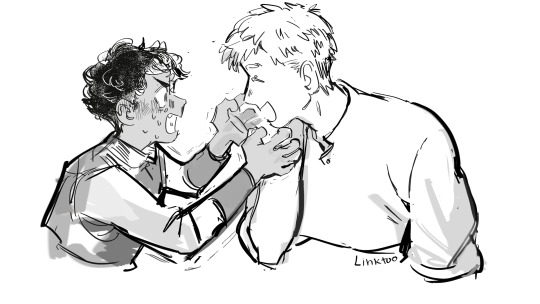
i'll strangle you or i'll kiss you on the mouth
#laius thorden#laios touden#kabru#dungeon meshi#delicious in dungeon#my art#Linktoo art#labru#narrative foil yaoi my weakness.... anyway#the way he grabs that guy and begs him to stay and begs like please LISTEN to me#its so funny how kabru‚ someone who prides himself with understanding people and their motivations#just can't handle having some random guy like laius with a big prophecy on his head remain a mystery to him#the way laius just entirely evades him it drives him crazy. kabru puts motivations and assumptions in his mouth in any attempt to Know him#hes so scared of this man yet simultaneously drawn by being unable to discern his thought process#meanwhile#laius is just autistic
13K notes
·
View notes
Text
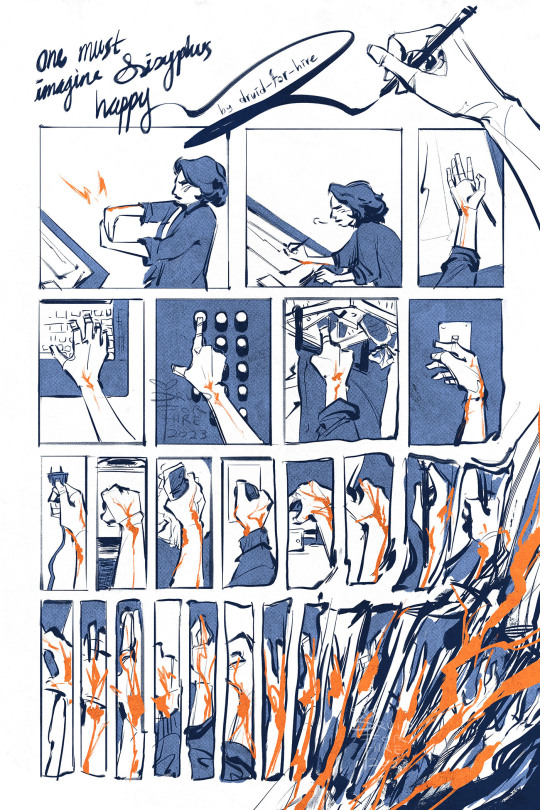
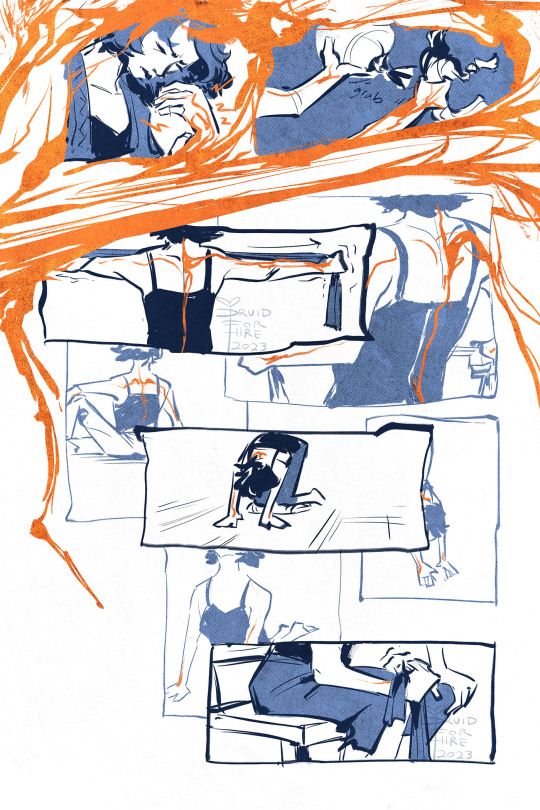
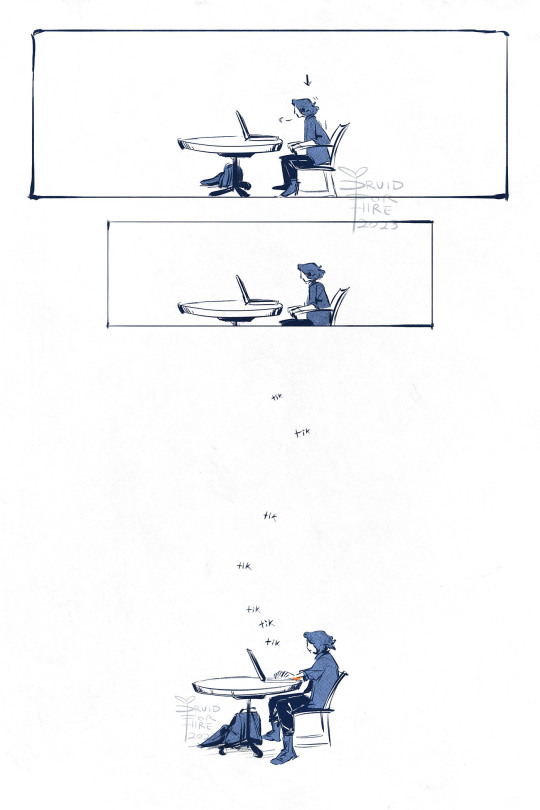
[images ID: three images of a comic titled "one must imagine sisyphus happy" by druid-for-hire. it is a visual narrative beginning with someone with wrist pain (depicted by bright orange nerves) working at a drafting table. the reader is shown the same wrist as the person uses it for many everyday tasks such as carrying a grocery basket, pushing elevator buttons, typing, and doing dishes, until the pain dissolves all the panels into chaos. the person then performs several physical therapy exercises until the pain subsides. they sit back down at a desk with their laptop, sigh, and begin typing. a small spark of pain reappears. end id]
a fun little piece i made during the semester and submitted into our school comic anthology! (which you can buy at the Static Fish table at MoCCAFest in NYC ;] ). it's about artists and injury
#comic art#comics#original comic#chronic pain#carpal tunnel#tendonitis#my art#original#edit: what a delightful surprise to see this take off#this was made for class on very low fuel and very few thoughts and late at night and exhausted#the prompt was just a wordless narrative essay. three pages. and i had nothing and no ideas#and my head hurt and i was too tired to think about doing any of the like. research and mind mapping and ideating i'd do otherwise#but my arm hurt#so i decided to do a thing about arm hurty#i'm surprised to see so many people finding it resonating with them#but then again i shouldn't be. the universal lies in the specific#i should make more things about smaller stuff
11K notes
·
View notes
Text
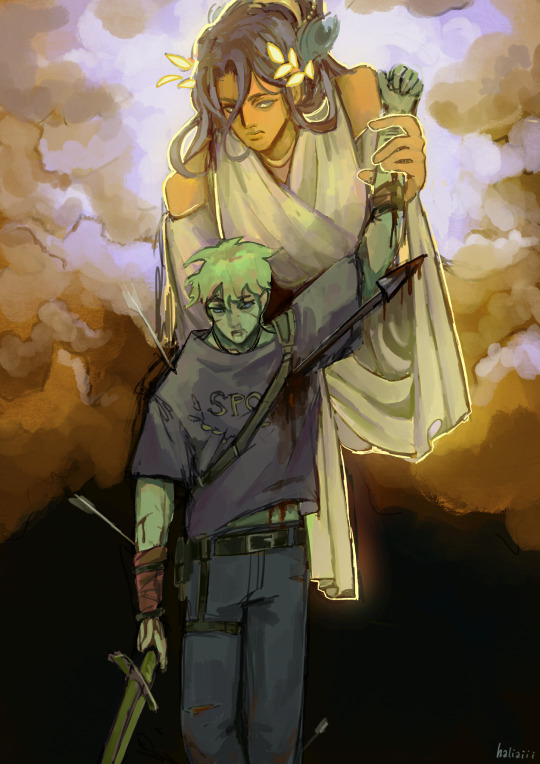
Juno’s champion
#uhh spoilers cough cough#had some deep Jason thoughts#rlly feel like he was missed potential tho 😔#actually fun fact I didn’t know heroes of Olympus was a sequel#so I started it as my first book into the Percy Jackson series and was really confused the entire time lmaooo#anyway my favorite characters are the ones doomed by the narrative#pjo hoo toa#pjo#pjo fanart#jason grace#percy jackson#percy jackon and the olympians#heroes of olympus#trials of apollo#pjo spoilers#my art#art#digital art#fanart#illustration#procreate#haliai art#toa spoilers#the burning maze spoilers
6K notes
·
View notes
Text



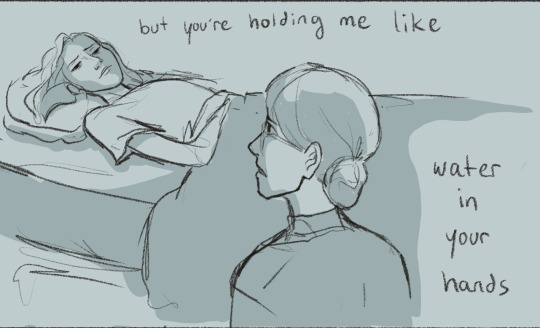
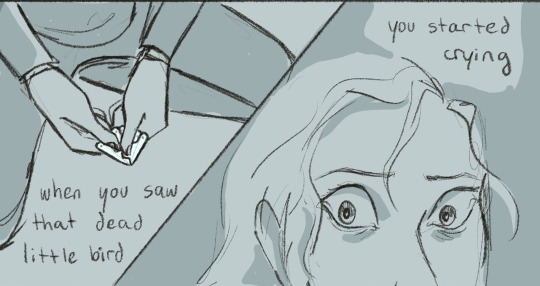


and if i could give you the moon,
#this one’s been in my drafts for like. ages.#feels narratively appropriate to release it now#moon song is sooooooo relevant to emilie agreste. or the version of her that exists in my head.#(all that anyone has of her is the version of her that exists in their head)#i thought about cleaning this up and then i didn’t👍#anyway happy friday. happy march. soon#ml#miraculous#miraculous ladybug#emilie agreste#nathalie sancoeur#adrien agreste#my art
4K notes
·
View notes
Text
Saw the sonic 3 trailer are you telling me the movie based on Sonic Adventure 2 is Not anti-military??? No anti-authority theming here?? Nothing?? The game where a kid gets gunned down? Where Shadow’s grief and hate for humanity is BECAUSE of the military?? Where Sonic runs from the cops and is consistently annoyed at their existence?
#sonic 3 spoilers#sonic 3 trailer#Sonic 3 trailer spoilers#I’m. just confused.#I don’t understand#WHERES AMY N ROUGE AS WELL bad day for women Jesus Christ#YOU COULD SO EASILY FIT THEM IN THE MOVIE THO. LIKE YOU CAN EASILY PUT THEIR NARRATIVES IN THERE TO COINCIDE WITH SONIC N SHADOW’S#the GAME DID IT. WHATS YOUR EXCUSE#we’re not gonna see Sonic get arrested. are we gonna see the fucked up prison cell of Gerald. probably not#I have Thoughts okay#I ramble
2K notes
·
View notes
Text
thinking about how the extra area added on to a pacifist run of undertale, the true lab, is about alphys's past mistakes. how it ends with the story reaffirming that, despite the pain she's caused, the thing that matters is that she has now made the choice to do the right thing. she's still worthy of her friends' love.
thinking about how undertale doesn't expect the player to get a pacifist ending for the first time. how it's more likely than not that the player will kill toriel the first time they battle her, how lots of players don't initially figure out how to end undyne's fight without killing her, etc. what it expects — not even expects, really, but hopes — is that the player, if they care enough, will use their canonically acknowledged power over time to make up for those mistakes.
no matter how many neutral runs a player has done before committing to the pacifist run, the thing that matters to the characters, to the story, is that you've chosen, now, to do the right thing.
compared to alphys, the player honestly gets off lightly, in that you're the only one (other than flowey) who really remembers any harm you might have caused. and any direct guilting the game could have done about it is long past at this point.
instead, as undertale often does, it makes its point via parallels: alphys caused harm, and she knows it. she has committed to being better. in doing so, she has unlocked for herself a better ending to her story. and she deserves it. she's forgiven.
those structural narrative parallels are all over undertale, if you know where to look. and that's one of the things that makes it so fuckin' good.
#undertale#alphys#true lab#this inspired by a mutual's alphys posting#and a discord convo i had a couple weeks back about ut's stance on ''punishing'' the player vs the monsters for their actions#and thoughts i've had generally post a certain fangame with a color in its name about just how well ut is structured as a narrative#everyone rightfully praises toby fox's character writing but stuff like this i think flies under the radar a bit by comparison#and it deserves to be appreciated#there's obvious Lore reasons why the true lab is only visited in a pacifist run (what's revealed about chara and flowey)#but this is the other half of it: the message of alphys's story hits hardest on a paci route post neutral runs#toby fox is a good writer more often than not
4K notes
·
View notes
Text
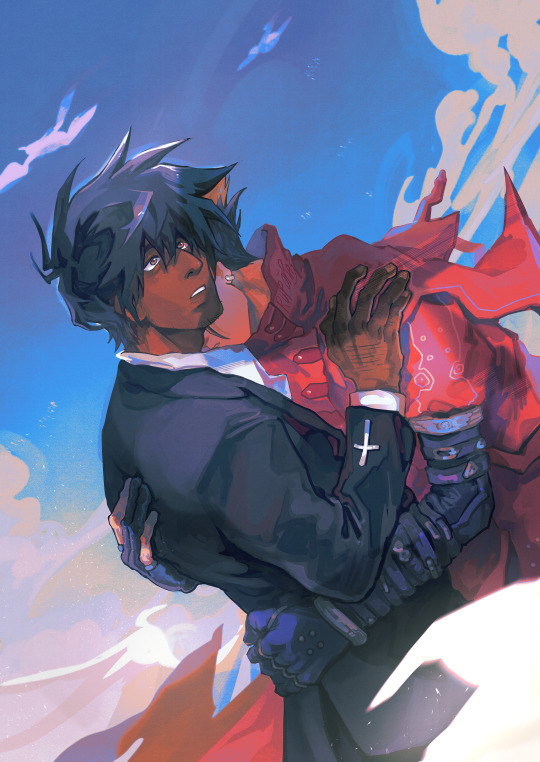

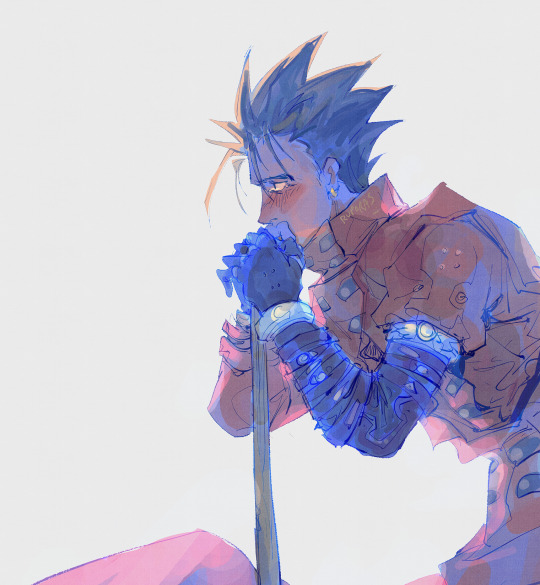
it's time to go, my love (ID in alt)
#vashwood#trigun maximum spoilers#vash the stampede#nicholas d wolfwood#trigun#trigun maximum#ruporas art#been in a very bad Art rut lately... the fatigue is finally catching up so i turned to my very trusty muses#to bring me somewhere. somehow its vol 10 i always return to. though i thnk this is the first time im posting v10 art#i have so many in my drafts but this vol always made me emotional. It's been a year now so my emotions#They've cleared up. Somewhat.#i think i just delusioned myself into a place where ww is always alive bc i draw him well and healthy all the time. his death is such an#essential part to the narrative though... i'll never be able to run from it completely :']. anyway. im not too sure how to elaborate my#Thoughts on this one but i am quite Happy with the blueness of it all.
2K notes
·
View notes
Text
#sparklepants#for me it’s the memory loss#never seen that trope done well. ever. and I’m actively mad about it every time it happens#tv tropes#narrative tropes#there’s like no good way to tag this huh#but I do want to know everyone’s thoughts#also hoping I didn’t miss something obvious as a choice
7K notes
·
View notes
Text
Skyrim's late-game power-fantasy-creep is so funny even by fantasy standards. Like, it's hilarious how it feels like it completely steamrolls everything else. By the end of the game you're:
the Chosen One
dragonslayer
Archmage of the only magic college in the kingdom
leader of a group of werewolf paladins (or alternatively a literal Vampire Lord)
vampire slayer
minor nobility of literally every county in the kingdom (and one not in the kingdom)
high ranking soldier of a faction of the civil war
personal conduit and champion for like a dozen various deities and gods
leader of an ancient and forgotten dragon-slaying warband
master of the thieves guild
leader of a group of serial killers
protector of the entire kingdom
member of a bard's college
Like imagine a person existing that had all these titles and also the actual lived experience to back it up.
2K notes
·
View notes
Text
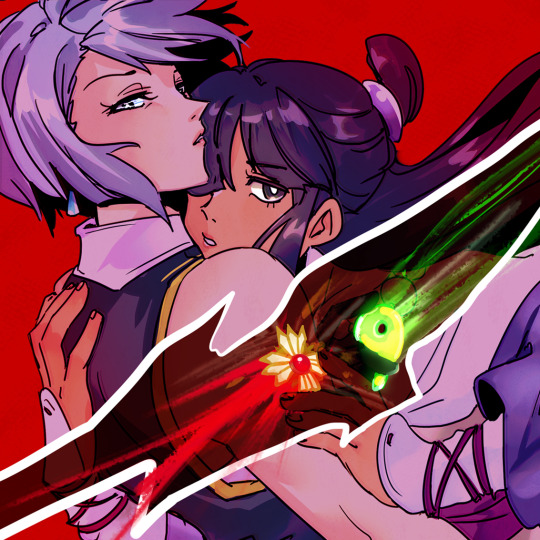
day 12: karma ♡
(femslashfeb prompt list)
#minifemslashfeb2024#ace attorney#franmaya#franziska von karma#maya fey#noooo babygirl don't have the same generational trauma as me aha ur so sexy#we're the. we're the daughters of the . the legends we don't want to inherit#'mini did you draw franz for this prompt solely because her name is von karma' don't worry about it#HONESTLY DID NOT THINK I WAS GONNA MAKE THIS ONE#had to go to the dentist today instead of drawing yuri#life is so cruel </3#but it's okay I have to shill my narrative foils agenda#back at it with the franmayas....#WHO LOVES PARALLELS#ME!! I LOVE PARALLELS!!!!#'karma' is referred to very loosely in this#but my idea personally was that they're betraying their family legacies#and THAT is karma for the way they were treated growing up#yeah I had all these thoughts at the dentist btw#thinking about yuri while two women have their hands in my mouth (professional) (normal) (not clickbait)#hope that helps
3K notes
·
View notes
Text

reunion 🌸
#persona 3#persona 3 spoilers#minato arisato#makoto yuki#ryoji mochizuki#aigis#ryomina#lizzy does art#HELLO EVERYONE!!! march 5th is upon us again so i bring... my contribution for this year. my third year drawing for it!#i made the thumbnail for this a few weeks after last year's graduation day#i thought it would be fun to lean into the ryominaigis angle of graduation day (you could read this as minato/aigis if you like-#but i feel like most people would read it as ryoji/minato)#IN ANY CASE working on this made me very emotional over this game :') (specifically minato)#i really enjoy how p3 ends it's such a nice way of wrapping up the narrative's messages and themes#working on this. minato's kindness was at the forefront of my mind throughout the piece#and i really wanted to capture how. ultimately it was his decision to sacrifice himself- to do the great seal#while to an outsider's perspective it is. sad that minato passes. i think becoming the seal is something that minato-#actively welcomes. in the same way that death (ryoji) is a comfort to him because death was housed in him for Ten YearsTM#AND I ALSO GOT REALLY SAD OVER AIGIS TOO. i still get fucked up over how in fes's animated cutscene for 3/5 they portray-#her as human and not drawing the robot parts so i wanted to do something smilar here...#but also i am very sad on aigis's behalf because she discovers her humanity through minato and realizes what she-#wants to do and then. well. minato is like. he's ready to pass on (even if he's scared) and im like. OH MY GOD THIS TRIO GETS ME MESSED UP#this was more coherent in my head LOL BUT ough i like drawing p3 and working through my feelings about it...#anyway! happy (in quotations) march 5th. i love this game to bits. it's so fun to draw for this day every year and see how i've improved#if you've read all this thank you :) lizzy appreciates you all very much. mwah! <3
2K notes
·
View notes
Text
if he’s your man then why is he jumping in front of lightning for me after he dumped your ass in prison and forgot about you
#like don’t get me wrong i know the real answer is that the narrative forgot about mai#and i do find it kind of ooc that zuko had literally no thoughts about mai till she showed up at his door lmao#but i still find this so fucking funny#zuko: katara i will risk death itself for you#also zuko in the same episode: oh shit it’s the loml totally forgot you’re still alive lmao#zutara#anti maiko
874 notes
·
View notes
Text
It's interesting how Buck's love interests are all written in a way that ends because of the reason they meet/happen in the first place and then of course, we have Eddie.
Abby, who changes Buck's view of a healthy relationship but then turns around and ghosts him, making him wait for months on end and letting him realize she's not coming back on his own.
Ali, who meets Buck during a dangerous situation in his line of work and then leaves him for how dangerous his work is.
Taylor, who lashes out at Buck for using her as a fake date and saying she thought she could trust Buck to be a friend who then ends up using him for her career and chose to put his friends in danger.
Natalia, who's there to help him embrace and deal with his temporary death but it leads to their break up because of the constant talk surrounding death when Buck's not comfortable with it.
We can't confirm for Tommy till it ends but it's important to note how he offers to get Buck into his interests like flying and muay thai yet doesn't show effort with Buck's interests like dressing up according to the bachelor party theme despite Buck being stressed about it. And we also have the fact that the entire reason they got together was due to Buck's jealousy for Eddie which he then claims to be was for Tommy. Makes me think they are either going to end because of differing interests OR because of the jealousy issue popping up again.
Funnily enough, every scene above has an Eddie parallel:
Eddie co-parents with Buck and not only does this not stop after a dangerous event but Eddie also has Buck down as a legal guardian (healthy relationship - Abby).
Eddie is in the same dangerous line of work and they have each other's backs. This happens right off the bat too.(dangerous job - Ali).
The Lawsuit era and The Dispatch era - both where they "betray" each other but manage to work through it (betrayal/lie - Taylor).
Eddie doesn't pressure Buck to talk about his temporary death until Buck's ready and is more focused about him living than in his death (death doula - Natalia).
Eddie who has different interests than Buck (poker, basketball and UFC/MMA) but also manages to show interest and actively takes part in whatever Buck comes up with; he suggests their outfit for the themed party AND ends up staying there for Buck even when others leave (different hobbies & showing interest/taking part - Tommy).
Absolutely fascinating when you start noticing that Buck's relationships keep failing for one reason or another and then we have him and Eddie who face the same sort of situations but they still come out of it stronger together.
It's clear that there's a reason Buck is able to overcome anything when it comes to Eddie (that conversation with Maddie about being there for each other even at their worst 👀) and we've already established that everything Eddie looks for in a partner is already something he has found in Buck. So really, all that's left is for them to realize that hey, the one I'm looking for is right in front of me! 🤷🏽
And yes, it's been said to death (hah) but you don't find it son you make it. And Buck and Eddie have already made it.
#character meta#relationship meta#think whatever you want it's up to you#but narratively tommy is a plot device#there's no if's or but's about it#I'm saying it like it is#the parallels between Buck's LIs and Eddie is insane#i just thought about making one about it since we mostly talk about how Buck fills all the things Eddie needs in a partner#this is my interpretation of how they've basically written themselves into a corner and the only possible way to go forward is with Buddie#doing anything else is a disservice to the characters and narrative so far#as Tim said#it's only natural and this is it#buck and eddie just naturally embody the ideal partner for each other#tim minear if you make me go through another destiel i will actually personally come and eat your kneecaps i can't do it anymore bro#it's literally all there!!#it's a masterpiece#i don't trust you enough but in Oliver ryan and jlh i trust#buddie#911 abc#eddie diaz#evan buckley#evan buck buckley#911 spoilers#I'm too lazy to tag all the characters because they're unimportant#the entire point of the post is Buck's LI vs Eddie anyways#so there
866 notes
·
View notes
Text
Against Lore

For the rest of May, my bestselling solarpunk utopian novel THE LOST CAUSE (2023) is available as a $2.99, DRM-free ebook!

One of my favorite nuggets of writing advice comes from James D Macdonald. Jim, a Navy vet with an encylopedic knowledge of gun lore, explained to a group of non-gun people how to write guns without getting derided by other gun people: "just add the word 'modified.'"
As in, "Her modified AR-15 kicked against her shoulder as she squeezed the trigger, but she held it steady on the car door, watching it disintegrate in a spatter of bullet-holes."
Jim's big idea was that gun people couldn't help but chew away at the verisimilitude of your fictional guns, their brains would automatically latch onto them and try to find the errors. But the word "modified" hijacked that impulse and turned it to the writer's advantage: a gun person's imagination gnaws at that word "modified," spinning up the cleverest possible explanation for how the gun in question could behave as depicted.
In other words, the gun person's impulse to one-up the writer by demonstrating their superior knowledge becomes an impulse to impart that superior knowledge to the writer. "Modified" puts the expert and the bullshitter on the same team, and conscripts the expert into fleshing out the bullshitter's lies.
Yes, writing is lying. Storytelling is genuinely weird. A storyteller who has successfully captured the audience has done so by convincing their hindbrains to care about the tribulations of imaginary people. These are people whose suffering, by definition, do not matter. Imaginary things didn't happen, so they can't matter. The deaths of Romeo and Juliet were less tragic than the death of the yogurt you had for breakfast. That yogurt was alive and now it's dead, whereas R&J never lived, never died, and don't matter:
https://locusmag.com/2014/11/cory-doctorow-stories-are-a-fuggly-hack/
Hijacking a stranger's empathic response is intrinsically adversarial. While storytelling is a benign activity, its underlying mechanic is extremely dangerous. Getting us to care about things that don't matter is how novels and movies work, but it's also how cults and cons work.
Cult leaders and con-artists know that they're engaged in mind-to-mind combat, and they make liberal use of Jim's hack of leaving blank spots for the mark to fill in. Think of Qanon drops: the mystical nonsense was just close enough to sensical that a vulnerable audience was compelled to try and untangle them, and ended up imparting more meaning to them than the hustler who posted them ever could have dreamt up.
Same with cons – there's a great scene in the Leverage: Redemption heist show where an experienced con-artist explains to a novice that the most convincing hustle is the one where you wait for the mark to tell you what they think you're doing, then run with it (scambaiters and other skeptics will recognize this as a relative of the "cold reading," where a "psychic" uses your own confirmations to flesh out their predictions).
As Douglas Adams put it:
A towel has immense psychological value. For some reason, if a strag (strag: non-hitch hiker) discovers that a hitch hiker has his towel with him, he will automatically assume that he is also in possession of a toothbrush, face flannel, soap, tin of biscuits, flask, compass, map, ball of string, gnat spray, wet weather gear, space suit etc., etc. Furthermore, the strag will then happily lend the hitch hiker any of these or a dozen other items that the hitch hiker might accidentally have "lost". What the strag will think is that any man who can hitch the length and breadth of the galaxy, rough it, slum it, struggle against terrible odds, win through, and still knows where his towel is is clearly a man to be reckoned with.
Magicians know this one, too. The point of a sleight is to misdirect the audience's attention, and use that moment of misattention to trick them, vanishing, stashing or producing something. The mark's mind is caught in a pleasurable agony: something seemingly impossible just happened. The mind splits into two parts, one of which insists that the impossible just happened, the other insisting that the impossible can't happen.
You know you've done it right if the audience says, "Do that again!" And that's the one thing you must not do. So long as you don't repeat the trick, the audience's imagination will chew on it endlessly, coming up with incredibly clever things that you must have done (a clever conjurer will know several ways to produce the same effect and will "do it again" by reproducing the effect via different means, which exponentially increases the audience's automatic imputation of clever methods to the performer).
Not for nothing, Jim Macdonald advises his writing students to study Magic and Showmanship, a classic text for aspiring conjurers:
https://memex.craphound.com/2007/11/13/magic-and-showmanship-classic-book-about-conjuring-has-many-lessons-for-writers/
There's a version of this in comedy, too. The scholarship of humor is clear on this: comedy comes from surprise. The audience knows they're about to be surprised when the punchline lands, and their mind is furiously trying to defuse the comedian's bomb before it detonates, cycling through potential punchlines of their own. This ramps up the suspense and the tension, so when the comedian does drop the punchline, the tension is released in a whoosh of laughter.
Your mind wants the tension to be resolved ASAP, but the pleasure comes from having that desire thwarted. Comedy – like most performance – has an element of authoritarianism. You don't give the audience what it wants, you give it what it needs.
Same goes for TTRPGs: the game master's role is to deny the players the victories and treasure they want, until they can't take it anymore, and then deliver it. That's the definition of an epic game. It's one of the durable advantages of human GMs over video game back-ends: they can ramp up the epicness by "cheating" on the play, giving the players the chance to squeak out improbable victories at the last possible second:
https://wilwheaton.typepad.com/wwdnbackup/2009/03/behind-the-screen.html
This is so effective that even crude approximations of it can turn video-games into cult hits – like Left4Dead, whose "Director" back-end would notice when the players were about to get destroyed and then substantially ramped up the chances of finding an amazing weapon – the chance would still be low overall, but there would be enough moments when the player got exactly what they'd been praying for, at the last possible instant, that it would feel amazing:
https://left4dead.fandom.com/wiki/The_Director#Special_Infected
Critically, Left4Dead's Director didn't do this every time. As any showman knows, the key to a great performance is "Always leave 'em wanting more." The musician's successful finale depends on doing every encore the audience demands, except the last one, so the crowd leaves with one tantalyzing and imaginary song playing in their minds, a performance better than any the musicians themselves could have delivered. Like the gun person who comes up with a cooler mod than the writer ever could, like the magic show attendee who comes up with a more elaborate explanation for the sleight than the conjurer could ever pull off, like the comedy club attendee whose imagination anticipates a surprise that grows larger the longer the joke goes on, the successful performance is an adversarial act of cooperation where the audience willingly and unwillingly cooperates with the performer to deny them the thing that they think they need, and deliver the thing they actually need.
This is my biggest problem with the notion that someday LLMs will get good enough at storytelling to give us the tales we demand, without having to suffer through a storyteller's sadistic denial of the resolutions we crave. When I'm reading a mystery, I want to turn to the last page and find out whodunnit, but I know that doing so will ruin the story. Telling the storyteller how the story should go is like trying to tickle yourself.
Like being tickled, experiencing only fun if the tickler respects your boundaries – but, like being tickled, there's always a part where you're squirming away, but you don't want it to stop. An AI storyteller that gives you exactly what you want is like a dungeon master who declares that every sword-swing kills the monster, and every treasure chest is full of epic items and platinum pieces. Yes, that's what you want, but if you get it, what's the point?
Seen in this light, performance is a kind of sado-masochism, where the performer delights in denying something to the audience, who, in turn, delights in the denial. Don't give the audience what they want, give them what they need.
What your audience needs is their own imagination. Decades ago, I was a freelance copywriter producing sales materials for Alias/Wavefront, a then-leading CGI firm that was inventing all kinds of never-seen VFX that would blow people away. One of the engineers I worked with told me something I never forgot: "Your imagination has more polygons than anything you can create with our software." He was talking about why it was critical to have some of the action happen in the shadows.
All of this is why series tend to go downhill. The first volume in any series leaves so much to the imagination. The map of the world is barely fleshed out, the characters' biographies are full of blank spots, the mechanics of the artifacts and the politics of the land are all just detailed enough that your mind automatically ascribes a level of detail to them, without knowing what that detail is.
This is the moment at which everything seems very clever, because your mind is just churning with all the different bits of elaborate lore that will fill in those lacunae and make them all fit together.
SPOILER ALERT: I'm about to give some spoilers for Furiosa.
.
.
.
.
.
.
.
.
FURIOSA SPOILERS AHEAD!
Last night, we went to see Furiosa, the latest Mad Max movie, a prequel to 2015's Fury Road, which is one of the greatest movies ever made. Like most prequels, Furiosa functions as a lore-delivery vehicle, and as such, it's nowhere near as good as Fury Road.
Fury Road hints as so much worldbuilding. We learn about the three fortresses of the wasteland (the Citadel, the Bullet Farm, and Gastown) but we only see one (The Citadel). We learn that these three cities have a symbiotic relationship with one another, defined by a complex politics that is just barely stable. We meet Furiosa herself, and learn something of her biography – that she had been stolen from the Green Place, that she had suffered an arm amputation.
All of this is left for us to fill in, and for a decade, my hindbrain has been chewing on all of that, coming up with cool ways it could all fit together. I yearned to know the "real" explanation, but it was always unlikely that this real explanation would be as enjoyable as my own partial, ever-unfinished headcanon.
Furiosa is a great movie, but its worst parts are the canonical lore it settles. Partly, that's because some of that lore is just stupid. Why is the Bullet Farm an open-pit mine? I mean, it's visually amazing, but what does that have to do with making bullets? Sometimes, it's because the lore is banal – the solarpunk Green Place is a million times less cool than I had imagined it. Sometimes, it's because the lore is banal and stupid: the scenes where Furiosa's arm is crushed, then severed, then replaced, are both rushed and quasi-miraculous:
https://www.themarysue.com/how-does-furiosa-lose-her-arm/
But even if the lore had been good – not stupid, not banal – the best they could have hoped for was for the lore to be tidy. If it were surprising, it would seem contrived. A story whose loose ends have been tidily snipped away seems like it would be immensely satisfying, but it's not satisfying – it's just resolved. Like the band performing every encore you demand, until you no longer want to hear the band anymore – the feeling as you leave the hall isn't satisfaction, it's exhaustion.
So long as some key question remains unresolved, you're still wanting more. So long as the map has blank spots, your hindbrain will impute clever and exciting mysteries, tantalyzingly teetering on the edge of explicability, to the story.
Lore is always better as something to anticipate than it is to receive. The fans demand lore, but it should be doled out sparingly. Always leave 'em wanting more.

If you'd like an essay-formatted version of this post to read or share, here's a link to it on pluralistic.net, my surveillance-free, ad-free, tracker-free blog:
https://pluralistic.net/2024/05/27/cmon-do-it-again/#better_to_remain_silent_and_be_thought_a_fool_than_to_speak_and_remove_all_doubt
#pluralistic#writing#lore#series#science fiction#the elaborations of a bad liar#always leave em wanting more#james d mcdonald#guns#pilkunnussija#craft#Silmarillion#sf#Better to Remain Silent and Be Thought a Fool than to Speak and Remove All Doubt#magic tricks#conjuring#narrative#mad max#furiosa
1K notes
·
View notes